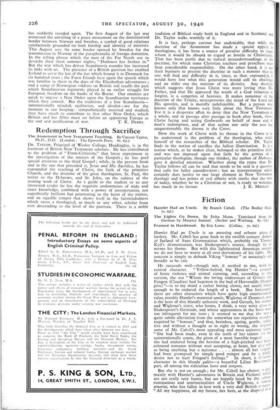Redemption Through Sacrifice
The Atonement in New Testament Teaching. By Vincent Taylor, Ph.D., D.D. (London : The Epworth Press. 8s. 6d.)
DR. TAYLOR, Principal of Wesley College, Headingley, is in the forefront of British New Testament scholars. He has contributed to the problem of "Form-Criticism," that latest experiment in the investigation of the sources of the Gospels ; he has paid special attention to the third Gospel ; while, in the present book and in the one that preceded it, Jesus and His Sacrifice, he has expounded the teaching of Christ, the faith of the primitive Church, and the doctrine of the great theologians, St. Paul, the writer to the Hebrews, and St. John, on the subject of the atoning work of Christ. As a guide to the student or to any interested reader he has the requisite endowments of wide and exact knowledge, combined with a power of interpretation, not superficially brilliant but penetrating to the heart of the matter, and an equable temper that shows itself in the fairmindedness which saves a theological, as much as any other, scholar from ever descending to the level of the partisan. There is a noble
tradition of Biblical study both in England and in Scotland, and Dr. Taylor walks worthily of it.
It is fact, perhaps curious but undeniable, that while the doctrine of the Atonement has made a special appeal to theologians, it has been a source of peculiar difficulty to many whom it would be absurd to regard as hostile to Christianity. That has been partly due to radical misunderstandings of the doctrine, for which some Christian teachers and preachers must bear considerable responsibility. On the other hand, it is not their business to present the doctrine in such a manner that no one will find any difficulty in it, since, as thus expounded, it would have lost what this generation would call its challenge and an older one the marrow of its divinity. Any doctrine which suggests that Jesus Christ was more loving than His Father, and that He appeased the wrath of a God reluctant to forgive, is a congeries of heresies. It makes nonsense of the doctrine of the Trinity, misrepresents the mind of the Lord and His apostles, and is morally indefensible. But a person who knows only that knows very little about the New Testament. For it is a desperate affair to deny that the New Testament as a whole, and in passage after passage in book after book, shows Christ facing and acting Godwards on behalf of man and of man's redemption, and of that action not only the seat but unquestionably the throne is the Cross.
How the work of Christ with its throne in the Cross is to be understood is the problem of the theologian, who avails himself of the researches of the Biblical scholar. Dr. Taylor finds in the notion of sacrifice the fullest illumination. It is 2 notion which, as he makes clear, belonged to the primitive faith and was not imposed upon that faith by the genius of particular theologian, though one thinker, the author of Hebrew: gave it detailed attention. Whether along the route that D: Taylor follows all can be said that needs to be said is a question that calls for fuller consideration ; but an interpretation whit`. certainly does justice to one large element in New Testamer: theology and has points of real affinity with truths that the ma- of today, whether he be a Christian or not, is ready to welcome


























 Previous page
Previous page